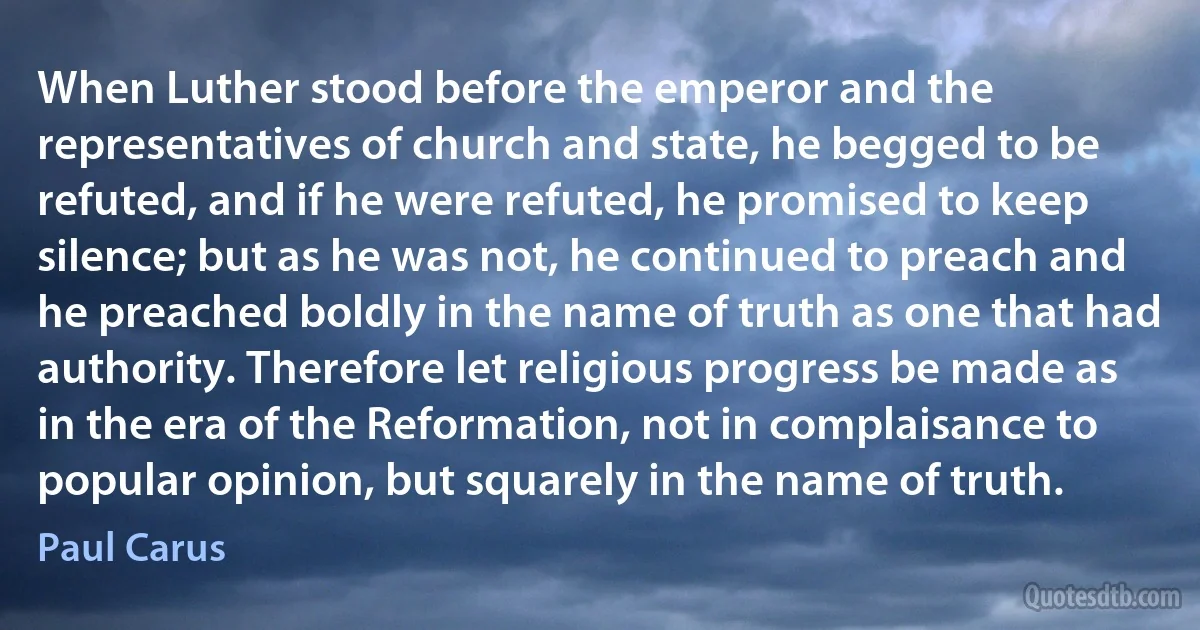Reformation Quotes - page 4
The world grows more enlightened. Knowledge is more equally diffused. Newspapers, magazines, and circulating libraries have made mankind wiser. Titles and distinctions, ranks and orders, parade and ceremony, are all going out of fashion.
This is roundly and frequently asserted in the streets, and sometimes on theatres of higher rank. Some truth there is in it; and if the opportunity were temperately improved, to the reformation of abuses, the rectification of errors, and the dissipation of pernicious prejudices, a great advantage it might be. But, on the other hand, false inferences may be drawn from it, which may make mankind wish for the age of dragons, giants, and fairies.

John Adams
We scarce ever had a prince, who by fraud, or violence, had not made some infringement on the constitution. We scarce ever had a parliament which knew, when it attempted to set limits to the royal authority, how to set limits to its own. Evils we have had continually calling for reformation, and reformations more grievous than any evils. Our boasted liberty sometimes trodden down, sometimes giddily set up, and ever precariously fluctuating and unsettled; it has only been kept alive by the blasts of continual feuds, wars, and conspiracies.

Edmund Burke
First, is the danger of futility: the belief there is nothing one man or one woman can do against the enormous array of the world's ills - against misery, against ignorance, or injustice and violence. Yet many of the world's great movements, of thought and action, have flowed from the work of a single man. A young monk began the Protestant Reformation, a young general extended an empire from Macedonia to the borders of the earth, and a young woman reclaimed the territory of France. It was a young Italian explorer who discovered the New World, and 32-year-old Thomas Jefferson who proclaimed that all men are created equal. "Give me a place to stand," said Archimedes, "and I will move the world." These men moved the world, and so can we all.

Robert F. Kennedy
These horrible affairs in France are the offspring of fanaticism. Yes, sir; if the reformation had taken place there, as well as here, religion and the clergy would have been respected, as they are here. Fanatics make atheists. If I cannot believe in God without believing that a wafer is God, my reason abjures the deity. I wish religion to exist: it is of infinite use to society, and I therefore wish it to be as rational as possible. A synod of the English church might order several objectionable tenets and expressions of our worship to be altered. I love those reformations that prevent revolutions, by keeping pace with the gradual progress of reason and knowledge.

Horace Walpole
Weirdly, the world suddenly feels bipolar. All over again the west confronts an irrationalist, agonistic, theocratic/ideocratic system which is essentially and unappeasably opposed to its existence. The old enemy was a superpower; the new enemy isn't even a state. In the end, the USSR was broken by its own contradictions and abnormalities, forced to realise, in Martin Malia's words, that "there is no such thing as socialism, and the Soviet Union built it". Then, too, socialism was a modernist, indeed a futurist, experiment, whereas militant fundamentalism is convulsed in a late-medieval phase of its evolution. We would have to sit through a renaissance and a reformation, and then await an enlightenment. And we're not going to do that.

Martin Amis
I do not look upon the French Revolution as a question subject to the ordinary calculation of politics; it is a thing which is to be; and, as all human experience has verified that the new doctrine ever finally subverts the old, as the Mosaic law subverted idolatry, as Christianity subverted the Jewish dispensation, as the Reformation subverted popery, so, I am firmly convinced, the doctrine of republicanism will finally subvert that of monarchy and establish a system of just and rational liberty on the ruins of the thrones of the despots of Europe.

Theobald Wolfe Tone
There are ideal series of events which run parallel with the real ones. They rarely coincide. Men and circumstances generally modify the ideal train of events, so that it seems imperfect, and its consequences are equally imperfect. Thus with the Reformation; instead of Protestantism came Lutheranism.

Novalis

